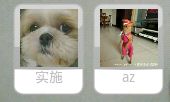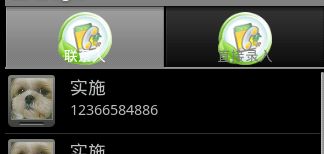Android---快速拨话程序(涵盖appWidget、Tab、联系人、多线程、自定义ListView使用)
快速拨话程序是之前学习android appWidget(窗口小部件)时在eoe找下载的一个appWidget程序,
它主要是在桌面上产生一个联系人的widget,点击可以直接拨打电话。因为感觉缺少点内容,不是
那么完美,所以现在有时间了就将它完善完善,添加了读取联系人图像,ListView的数据源采用重
写BaseAdapter进行绑定,并且添加了一个多线程加载联系人信息等。而这个apk主要围绕的内容也
是这几方面Android下的AppWidget、Tab的使用、多线程(AsyncTask)的使用,联系人的读取
、自定义ListView使用。也许这些方面讲得不深,就需要各位看官自己多多学习使用了。
效果图:


(1)Tab:选项卡,在同一个界面中,选择不同的选项卡,呈现不同界面布局。这里添加选项卡一方
面是读取系统中的联系人列表、另一方面允许用户自行输入一个昵称和电话号码而产生一个快捷拨话
Widget。android中的Tab,一个TabSpec表示一个选项卡,而所有的TabSpec都由TabHost管理。
TabHost载入基本的xml布局文件。R.layout.main:最外层是框架布局,尔后是两个TapSpec的LinearLayout布局
 代码
代码
<
FrameLayout
android:id
="@+id/FrameLayout01"
android:layout_width
="fill_parent"
android:layout_height
="fill_parent"
xmlns:android
="http://schemas.android.com/apk/res/android"
>
<
LinearLayout
android:id
="@+id/listPhone"
android:layout_width
="fill_parent"
android:layout_height
="wrap_content"
>
<
ListView
android:id
="@+id/lvphone"
android:layout_width
="fill_parent"
android:layout_height
="wrap_content"
></
ListView
></
LinearLayout
>
<
LinearLayout
android:id
="@+id/inputPhone"
android:layout_width
="wrap_content"
android:layout_height
="wrap_content"
android:orientation
="vertical"
>
<
TextView
android:text
="姓名"
android:layout_width
="wrap_content"
android:layout_height
="wrap_content"
></
TextView
>
<
EditText
android:id
="@+id/etname"
android:layout_width
="200px"
android:layout_height
="wrap_content"
android:hint
="请输入联系人姓名"
></
EditText
>
<
TextView
android:text
="电话号码"
android:layout_width
="wrap_content"
android:layout_height
="wrap_content"
></
TextView
>
<
EditText
android:id
="@+id/etphone"
android:layout_width
="200px"
android:layout_height
="wrap_content"
android:phoneNumber
="true"
android:hint
="请输入电话号码"
></
EditText
>
<
Button
android:id
="@+id/btnadd"
android:layout_width
="wrap_content"
android:layout_height
="wrap_content"
android:text
=" 保 存 "
></
Button
>
<
ImageView
android:id
="@+id/imgshow"
android:layout_width
="wrap_content"
android:layout_height
="wrap_content"
></
ImageView
>
</
LinearLayout
>
</
FrameLayout
>
Activity中载入Tab:
 代码
代码
tabhost
=
this
.getTabHost();
LayoutInflater.from(
this
).inflate(R.layout.main, tabhost.getTabContentView(),
true
);
TabSpec spec1
=
tabhost.newTabSpec(
"
listPhone
"
);
//
setIndicator设置了TabSpec显示的标题、图标
spec1.setIndicator(
"
联系人
"
,
this
.getResources().getDrawable(R.drawable.icon));
//
R.id.listPhone是R.layout.main布局文件中的一个LinearLayout布局
spec1.setContent(R.id.listPhone);
TabSpec spec2
=
tabhost.newTabSpec(
"
inputPhone
"
);
spec2.setIndicator(
"
直接录入
"
,
this
.getResources().getDrawable(R.drawable.icon));
spec2.setContent(R.id.inputPhone);
tabhost.addTab(spec1);
tabhost.addTab(spec2);
setContentView(tabhost);
(2)AppWidget:android的AppWidget使用也是配置比较多,首先是显示在桌面上的布局appwidget.xml,很简
单只有一个ImageView和TextView用来显示联系人的图标和昵称;其次是AppWidget配置xml,新建xml选择
AppWidget Provider会自动产生一个文件在res/xml中,它包含了Widget在桌面的大小(74*单元格-2),
单位dip,Widget自动更新的周期(android:updatePeriodMillis),添加Widget时假如要先进入一个界面进行配置,
这个就指定了配置Activity是谁(android:configure="com.android.cbin.Main");最后就是在manifest.xml中
关于AppWidget的配置了桌面Widget布局xml:
 代码
代码
<?
xml version="1.0" encoding="utf-8"
?>
<
LinearLayout
xmlns:android
="http://schemas.android.com/apk/res/android"
android:layout_width
="wrap_content"
android:layout_height
="wrap_content"
android:orientation
="vertical"
android:id
="@+id/widLinear"
android:focusable
="true"
android:focusableInTouchMode
="true"
android:clickable
="true"
android:clipChildren
="true"
android:background
="@drawable/shortcallbg"
>
<
ImageView
android:layout_width
="70px"
android:layout_height
="58px"
android:id
="@+id/img"
android:layout_gravity
="center"
android:layout_marginTop
="10dip"
android:layout_marginLeft
="1px"
android:layout_marginRight
="1px"
android:focusable
="true"
android:clickable
="true"
></
ImageView
>
<
TextView
android:layout_width
="wrap_content"
android:layout_height
="wrap_content"
android:singleLine
="false"
android:id
="@+id/txtname"
android:layout_gravity
="center"
android:gravity
="center"
android:layout_marginBottom
="2px"
></
TextView
>
</
LinearLayout
>
AppWidget配置xml:
 代码
代码
<?
xml version="1.0" encoding="utf-8"
?>
<
appwidget-provider
xmlns:android
="http://schemas.android.com/apk/res/android"
android:minWidth
="72dip"
android:updatePeriodMillis
="0"
android:minHeight
="72dip"
android:configure
="com.android.cbin.Main"
>
</
appwidget-provider
>
manifest.xml中AppWidget配置信息:
 代码
代码
<?
xml version="1.0" encoding="utf-8"
?>
<
manifest
xmlns:android
="http://schemas.android.com/apk/res/android"
package
="com.android.cbin"
android:versionCode
="1"
android:versionName
="1.0"
>
<
application
android:icon
="@drawable/icon"
android:label
="@string/app_name"
>
<
activity
android:name
=".Main"
android:label
="@string/app_name"
>
<
intent-filter
>
<
action
android:name
="android.appwidget.action.APPWIDGET_CONFIGURE"
></
action
>
</
intent-filter
>
</
activity
>
<
receiver
android:name
="CallWidget"
>
<
intent-filter
>
<
action
android:name
="android.appwidget.action.APPWIDGET_UPDATE"
></
action
>
</
intent-filter
>
<
meta-data
android:name
="android.appwidget.provider"
android:resource
="@xml/callwidget"
></
meta-data
>
</
receiver
>
</
application
>
<
uses-sdk
android:minSdkVersion
="7"
/>
<
uses-permission
android:name
="android.permission.CALL_PHONE"
></
uses-permission
>
<
uses-permission
android:name
="android.permission.READ_CONTACTS"
></
uses-permission
>
</
manifest
>
(3)联系人信息的读取:包括电话号码和姓名还有相片ID
 代码
代码
public
List
<
Map
<
String,Object
>>
getData(){
list
=
new
ArrayList
<
Map
<
String,Object
>>
();
Map
<
String,Object
>
map;
ContentResolver resolver
=
this
.getContentResolver();
Cursor cursor
=
resolver.query(ContactsContract.Contacts.CONTENT_URI,
null
,
null
,
null
,
null
);
while
(cursor.moveToNext()){
int
cname
=
cursor.getColumnIndex(PhoneLookup.DISPLAY_NAME);
String name
=
cursor.getString(cname);
//
获得联系人姓名
int
cpid
=
cursor.getColumnIndex(PhoneLookup.PHOTO_ID);
String photoid
=
cursor.getString(cpid);
int
cid
=
cursor.getColumnIndex(PhoneLookup._ID);
String id
=
cursor.getString(cid);
//
获得联系人ID
//
联系人是否有电话号码
int
has_p_n
=
cursor.getColumnIndex(ContactsContract.Contacts.HAS_PHONE_NUMBER);
int
phoneCount
=
cursor.getInt(has_p_n);
if
(phoneCount
>
0
){
Cursor numbers
=
resolver.query(ContactsContract.CommonDataKinds.Phone.CONTENT_URI,
null
, ContactsContract.CommonDataKinds.Phone.CONTACT_ID
+
"
=
"
+
id,
null
,
null
);
String number
=
""
;
while
(numbers.moveToNext()){
int
cnumber
=
numbers.getColumnIndex(ContactsContract.CommonDataKinds.Phone.NUMBER);
number
=
numbers.getString(cnumber);
map
=
new
HashMap
<
String, Object
>
();
map.put(
"
name
"
, name);
map.put(
"
phone
"
, number);
map.put(
"
photo
"
, photoid);
list.add(map);
}
numbers.close();
}
}
cursor.close();
return
list;
}
通过联系人PhotoID得到一个Bitmap对象
 代码
代码
//
获取联系人图片
public
static
Bitmap getPhoto(Context ct,Object photo_id){
Bitmap bmp
=
BitmapFactory.decodeResource(ct.getResources(),
R.drawable.ic_contact_picture);
if
(photo_id
!=
""
&&
photo_id
!=
null
){
String[] projection
=
new
String[]{ContactsContract.Data.DATA15};
String selection
=
"
ContactsContract.Data._ID =
"
+
photo_id.toString() ;
Cursor cur
=
ct.getContentResolver().query(ContactsContract.Data.CONTENT_URI, projection, selection,
null
,
null
);
if
(cur
!=
null
){
cur.moveToFirst();
byte
[] contactIcon
=
null
;
contactIcon
=
cur.getBlob(cur.getColumnIndex(ContactsContract.Data.DATA15));
if
(contactIcon
!=
null
){
bmp
=
BitmapFactory.decodeByteArray(contactIcon,
0
, contactIcon.length);
}
}
}
return
bmp;
}
(4)自定义ListView:因为是自定义ListView所以我们必须重写ListView的数据源对象BaseAdapter。添加一个与Item相对于的控件类ViewHolder,添加一个构造函数,传入Context和List数据,Context对象用于获得LayouInfalter(加载ListView的单个Item对象).重写其中的
getCount()、getItem()、getItemId()、getView()四个方法;
 代码
代码
public
class
MyAdapter
extends
BaseAdapter {
private
Context context;
private
List
<
Map
<
String,Object
>>
list;
private
LayoutInflater mInflater;
public
MyAdapter(Context ct,List
<
Map
<
String,Object
>>
lt){
context
=
ct;
list
=
lt;
mInflater
=
LayoutInflater.from(context);
}
public
final
class
ViewHolder{
public
ImageView image;
public
TextView tvname;
public
TextView tvphone;
public
QuickContactBadge qcbimg;
}
@Override
public
int
getCount() {
//
TODO Auto-generated method stub
//
返回List的size
if
(list
!=
null
){
return
list.size();
}
else
{
return
0
;
}
}
@Override
public
Object getItem(
int
position) {
//
TODO Auto-generated method stub
if
(list
!=
null
){
//
返回某个位置的Map<String,Object>
return
list.get(position);
}
else
{
return
null
;
}
}
@Override
public
long
getItemId(
int
position) {
//
TODO Auto-generated method stub
//
返回当前位置
return
position;
}
@Override
public
View getView(
int
position, View convertView, ViewGroup parent) {
//
TODO Auto-generated method stub
//
返回某个位置的View
ViewHolder holder
=
null
;
if
(convertView
==
null
){
holder
=
new
ViewHolder();
convertView
=
mInflater.inflate(R.layout.listitem,
null
);
holder.qcbimg
=
(QuickContactBadge) convertView.findViewById(R.id.qubimg);
holder.tvname
=
(TextView)convertView.findViewById(R.id.txtname);
holder.tvphone
=
(TextView)convertView.findViewById(R.id.txtphone);
convertView.setTag(holder);
}
else
{
holder
=
(ViewHolder) convertView.getTag();
}
holder.tvname.setText(list.get(position).get(
"
name
"
).toString());
holder.tvphone.setText(list.get(position).get(
"
phone
"
).toString());
holder.qcbimg.setImageBitmap(Main.getPhoto(context,list.get(position).get(
"
photo
"
)));
return
convertView;
}
}
(5)多线程加载联系人信息:因为加载联系人信息可能是一个比较耗时的操作,所以用到了AsyncTask
 代码
代码
private
class
LoadAnysTack
extends
AsyncTask
<
String,Void,BaseAdapter
>
{
@Override
protected
BaseAdapter doInBackground(String... arg0) {
//
TODO Auto-generated method stub
BaseAdapter adapter
=
new
MyAdapter(Main.
this
,getData());
return
adapter;
}
protected
void
onPostExecute(BaseAdapter ada){
lview.setAdapter(ada);
dialog.dismiss();
}
}
调用AsyncTask
new
LoadAnysTack().execute(
""
);